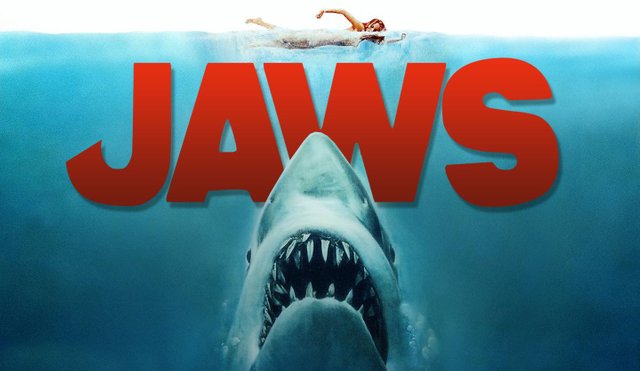
Peter Benchley wrote novel Jaws at the publisher's persuasion, but, as he admited, he was not too craving for that idea, but he needed the money - he got a $ 1,000 advance for the first 100 pages. His idea came to him, as he said again, not at the very brightest moment of his life, while he was sitting on the shore and looking at the calm sea, wondering what would happen to such an infamous perch in such a quiet environment. Using the real facts about several caught sharks in that area during the 1960s, he wrote a story of a large white shark that terrorizes a pleasant resting place, denying that Moby Dick had any influence on his imagination.
It is interesting that the idea did not appeal to anyone, even to his wife who encouraged him to go into something else. But if you have not read this novel, you might be a little jumpy because it's a lot darker than the movie itself. It also has marital infidelity, hostility, somewhat depressing thoughts, and it is generally considered that the characters are more or less unimaginative (as Spielberg himself said) but that the tale as such caught the interest in the audience and the novel had endured incredible 44 weeks on reading charts. This, of course, does not go unnoticed.
How did Steven Spielberg fall into the whole story? Accidentally.
He saw it on a desk of a secretary from one of the bosses of Universal Studios in the first draft scenario (written by Benchley himself) and immediately hooked up (his title was tempting, honest) and put forward a motion to direct it. In the perfect world, he would got that job. But in fact, they thanked him and said that the director has already been hired. Producers Richard D. Zanuck and David Brown decided to leave the job to the director Dick Richards. And everything was beautifully packed until Richards began to describe the introductory scene at a meeting; the sea, the blue, the waves and suddenly jump off the big whale. It remains unclear whether Richards really did not know the difference between whales and sharks or that he saw that the main villain was a big mammal, but Zanuck and Brown thanked him for his cooperation and invited Spielberg again.

The problems with the whole project started at the very beginning, before the big mechanical Bruce proved to be the worst actor ever. Nobody wanted to play in the movie. Today it is the cornerstone of somebody's career, but then it was a simple little monster movie that had a budget of about $ 4 million.
The first contact was Richard Dreyffus, according to George Lucas's recommendation. Dreyffus refused. Five times. He went so far, half joking, half in reality that he even tried to persuade Spielberg to leave that movie. "No, thank you," said many other, more powerful actors, such as Lee Marvin.
Roy Scheider went into a story almost accidentally at a party, where he met already depressing Spielberg, who loudly and loudly screamed the whole story and problems around the scripts and actors.
Scheider was chosen for the role (and that was exactly what Spielberg wanted - someone with whom the audience can sympathize). Zanuck and Brown brought Robert Shawa for their excellent co-operation on their previous movie The Sting. Shaw immediately jumped into Quinta's dangerous boots, and somehow at that time Dreyffus returned to the crew. Not because he suddenly realized that this would be a great movie, but because his last movie, which was to open, was a nasty, but really nasty fail, and he thought no one will ever hire him.
THE SHOOTING
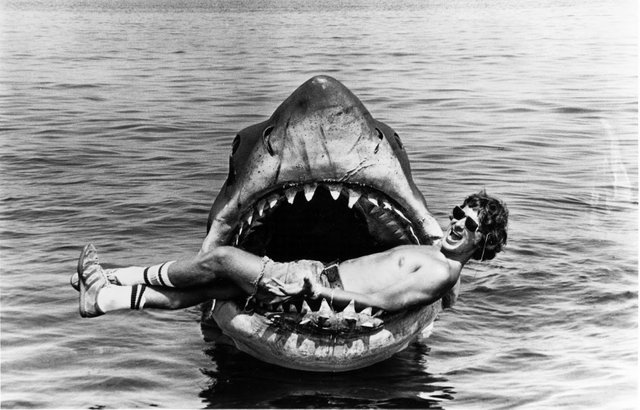
For a sea monster movie you have to have a sea monster. What Spielberg's is most talked about today is how genius was not to show the shark all the way to the finals itself. He created mysticism, tension, and he challenged the spectator's imagination.
But, the original approach to the movie showed the shark in its full glory, appearing in the scene after scene, including the introductory one when he eats a naked girl. As the shark was gone, it had to be improvised. The introductory scene, where the impression that a shark throws a girl left-to-right is made with the help of a rope. She was stranded and the men pulled her off the shore slightly to the left, and to the right.
But there is a new problem emerging. Camera and water and salt are not a good combination, so they invented a special glass case to successfully capture underwater scenes. Turning around the scene where the dog was supposed to appear, Spielberg had created an illusion of something big and dangerous even though there was nothing in the water.
The shark, Bruce, did exist but didn't work. However, it worked great when tested in freshwater, but when it came to the sea, the salt was constantly causing malfunctions. This vast replica of the sea nemesis, ran on a number of cables, hoops, cranes, and when it was in the water, it had to be followed by a huge raft.
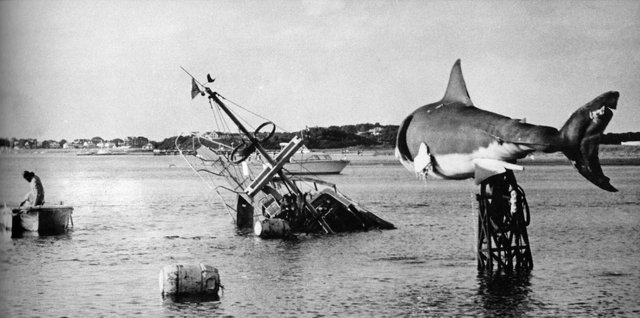
It is worth mentioning that is a really a bad decision to shoot at the open sea. Martha's Vinyard is a popular destination for everyone; swimmers, divers, and sailboats. Although the whole thing about shooting a popular bestseller novel was kept in relative secrecy, some enthusiast managed to record Bruce in his dismal condition, full of cables and tubes, and the picture came out to the public, which is why the film, which then began to enter the first delays, was welcomed with more mockery.
The reason why it was believed that Jaws would turn out to be a bad business move showed more in the end than at the beginning of the shooting. It exceeded all healthy schedule deadlines, and instead of 80 days of filming it was almost around 140. But the biggest problem was the cost. The film initially had a budget of about 3-4 million, but in the end it was 14. Today, the equivalent would be to make a movie of about 30 million and get it to 140. No one normal would have believed that you would be able to get it back.
The bosses of the Universal didn't fire Spielberg, not that they loved him, but, strangely, the producers, Zanuck and Brown covered him, taking over all the negative criticisms on themselves. For someone who was only 27 years old, that was a really happy circumstance.
But, in spite of this, it was not expected that the film would pay back until it started playing at the cinema. What no one could have predicted was the good reaction of the audience and the film soon became an event to be seen. The earnings were such that it was something incredible, the film earned about $470 million in its initial movie life, which would be over $ 2 billion today (if we count inflation and everything else). At that time, the most successful films were held by James Bond films, which sprang around one hundred million worldwide earnings (it's just an illustration to see the difference in earnings and why it was all that incredible). (1)
.jpg)
SYNOPSIS
''One early summer night on fictional Atlantic resort Amity Island, Chrissie decides to take a moonlight skinny dip while her friends party on the beach. Yanked suddenly below the ocean surface, she never returns. When pieces of her wash ashore, Police Chief Brody (Roy Scheider) suspects the worst, but Mayor Vaughn (Murray Hamilton), mindful of the lucrative tourist trade and the approaching July 4th holiday, refuses to put the island on a business-killing shark alert. After the shark dines on a few more victims, the Mayor orders the local fishermen to catch the culprit. Satisfied with the shark they find, the greedy Mayor reopens the beaches, despite the warning from visiting ichthyologist Hooper (Richard Dreyfuss) that the attacks were probably caused by a far more formidable Great White. One more fatality later, Brody and Hooper join forces with flinty old salt Quint (Robert Shaw), the only local fisherman willing to take on a Great White--especially since the price is right. The three ride off on Quint's boat "The Orca," soon coming face to teeth with the enemy. '' (2)
Behind the scenes photos
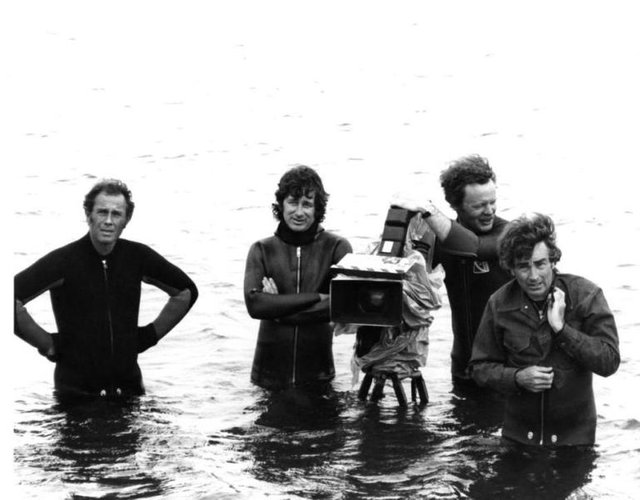
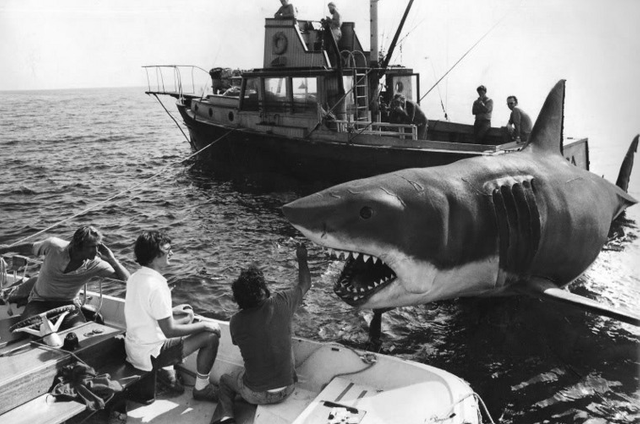

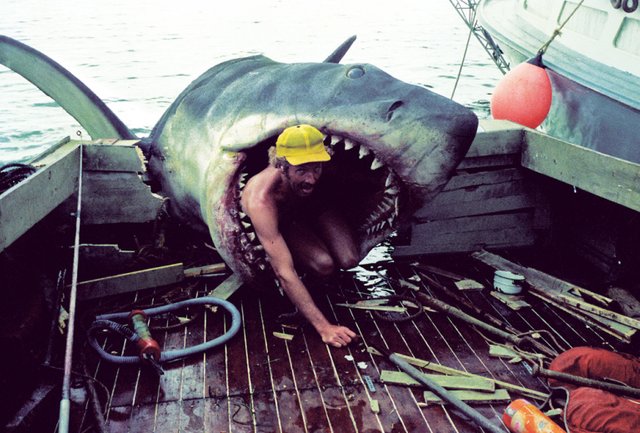
(1) For the first part of this post I translated from croatian to english, partly an essay by D. Špelic, who wrote a big article on 40th aniversary of Jaws
(2) Fandango, synopsis by Lucia Bozzola
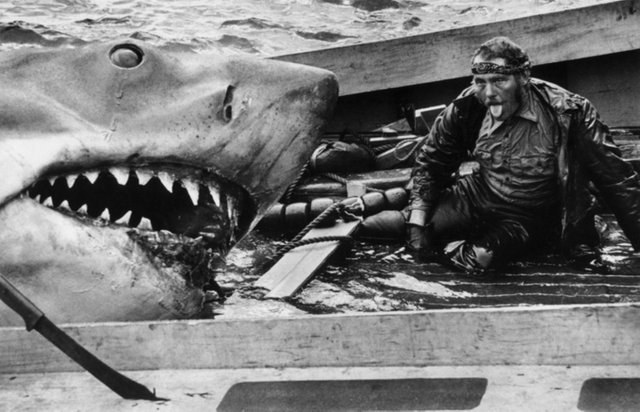
Best Photography...
Downvoting a post can decrease pending rewards and make it less visible. Common reasons:
Submit